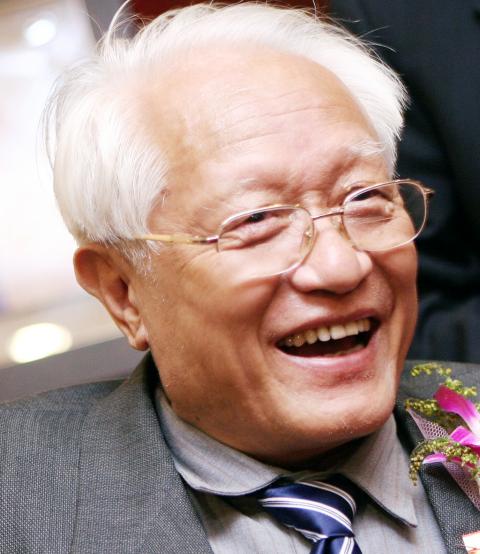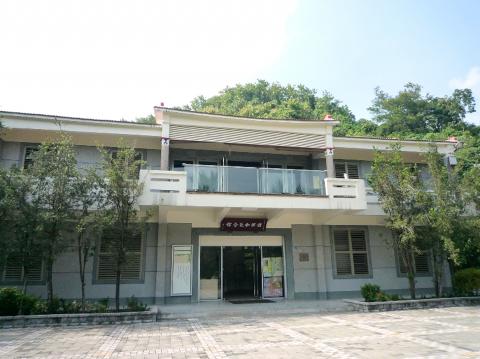When activist and author Chung Tie-min (鍾鐵民) passed away last month at the age of 70, he left behind the legacy of a life spent championing the environment.
Chung is best known as the son of Hakka writer Chung Li-ho (鍾理和), my uncle, and as leader of a group of activists who opposed the building of the Meinong Reservoir (美濃水庫). He published eight books, including novels and collected essays, and was a founding member of the group that became the Chung Li-ho Literary Foundation (鍾理和文教基金會). In 1983, the foundation opened the Chung Li-ho Memorial Hall (鍾理和紀念館) in Meinong Township (美濃), Kaohsiung — the first civilian-founded memorial hall dedicated to literary writers in Taiwan.
The hall is two stories high, with a pagoda-style roof, and built on land provided by Chung Li-ho’s family. It holds manuscripts, belongings and pictures he left behind. It also stores the manuscripts of other Taiwanese writers, including Wu Cho-liu (吳濁流), author of The Orphan of Asia (亞細亞的孤兒), and Cheng Ching-wen (鄭清文). A garden near the building features statues of literary figures and stones inscribed with poetry.

Photo: Taipei Times
A service for Chung Tie-min will be held at 9am today at the memorial hall, and the second floor has been refitted for an exhibition covering his life.
Chung Tie-min was born in 1941 with tuberculous spondylitis, a kind of tuberculosis that affected the thoracic portion of his spine. The family did not have the funds to treat his condition until he was 29, a delay that left him with a hunched back.
Chung died from heart failure caused by excess fluids that accumulated in his pleura, the fluid-filled space that surrounds the lungs. Symptoms began in July when he experienced great pain, though at the time it was thought to be a complication from surgery to correct his hunched back at the Chang Gung Memorial Hospital in May last year. He was hospitalized for a heart attack on Aug. 8, and he passed away on Aug. 22.

Photo courtesy of the Chung Li-ho Literary Foundation
CHUNG THE ACTIVIST
The Meinong Reservoir, which was originally planned by the Chinese Nationalist Party (KMT) administration in 1992 to provide a water supply for the Southern Taiwan Science Park (南部工業科學園區) and to better manage water resources in the area, was opposed by some Meinong residents on the grounds of safety and the belief that it would be detrimental to the environment.
The Meinong residents were afraid that if a natural disaster occurred, a resulting flood could wipe out the entire town of Meinong, and environmentalists protested that the building of the reservoir would have irreparably damaged the Yellow Butterfly Valley (黃蝶翠谷), home to Catopsilia butterflies and several species of endangered animals.
In 1993, Chung Tie-min presented the residents’ objections to the dam outside the Legislative Yuan, drawing national attention to the issue. The government eventually abandoned the project amid public outcry.
Tseng Kuei-hi (曾貴海), Chung Tie-min’s personal physician as well as friend, told the Taipei Times last month that he should be remembered for his contribution to literature and the maintenance of the memorial hall, rather than for his role in opposing the reservoir.
Because Chung Tie-min lived next to the hall and was the direct descendant of Chung Li-ho, he was an ideal director for the facility, managing day-to-day business and taking it upon himself to meet writers or other figures of renown when they visited.
“This is a great loss, both to the running of the memorial hall and to the literary circle,” Tseng said. “It will be difficult to find and train anyone who will be able to do the job as well as Chung Tie-min did.”
Author Lee Chiao (李喬), renowned for his play Winter Night (寒夜) and a friend of Chung Tie-min, told the Taipei Times that the activist’s role as leader in opposing the Meinong Reservoir was not prompted by political ambition.
“His motivation resulted from him inheriting his father’s literary spirit,” Lee said. “That spirit, while pastoral in genre, was not the same as pastoral writing from the West.”
Lee said that while Western pastoral literature was influenced by socialism and often dealt with class struggle, the majority of Chung Li-ho’s writings were simply a reflection of his fight with poverty and natural disasters. The elder Chung had been a farmer until pulmonary tuberculosis forced him to stay in bed.
Lee said that Chung Li-ho’s writing reflected the gentleness of farmers, and brought out “a Taiwan-centric ideology” (台灣意識), as he was one of the first writers to focus on Taiwan during a time when most others explored subject matter from a China-based point of view.
According to Lee, Chung Tie-min inherited both his father’s gentleness and his pride in Taiwan, capturing the changes of the country’s rural areas since the early 1970s.
Passing away in his home in Meinong’s Jian Shan (尖山), Chung Tie-min left behind something that is not political or simply literary, but exceeds both. Lee described it as “a passion for the land itself,” something that will always remain despite his death.

June 2 to June 8 Taiwan’s woodcutters believe that if they see even one speck of red in their cooked rice, no matter how small, an accident is going to happen. Peng Chin-tian (彭錦田) swears that this has proven to be true at every stop during his decades-long career in the logging industry. Along with mining, timber harvesting was once considered the most dangerous profession in Taiwan. Not only were mishaps common during all stages of processing, it was difficult to transport the injured to get medical treatment. Many died during the arduous journey. Peng recounts some of his accidents in

“Why does Taiwan identity decline?”a group of researchers lead by University of Nevada political scientist Austin Wang (王宏恩) asked in a recent paper. After all, it is not difficult to explain the rise in Taiwanese identity after the early 1990s. But no model predicted its decline during the 2016-2018 period, they say. After testing various alternative explanations, Wang et al argue that the fall-off in Taiwanese identity during that period is related to voter hedging based on the performance of the Democratic Progressive Party (DPP). Since the DPP is perceived as the guardian of Taiwan identity, when it performs well,

A short walk beneath the dense Amazon canopy, the forest abruptly opens up. Fallen logs are rotting, the trees grow sparser and the temperature rises in places sunlight hits the ground. This is what 24 years of severe drought looks like in the world’s largest rainforest. But this patch of degraded forest, about the size of a soccer field, is a scientific experiment. Launched in 2000 by Brazilian and British scientists, Esecaflor — short for “Forest Drought Study Project” in Portuguese — set out to simulate a future in which the changing climate could deplete the Amazon of rainfall. It is

The Taiwan People’s Party (TPP) on May 18 held a rally in Taichung to mark the anniversary of President William Lai’s (賴清德) inauguration on May 20. The title of the rally could be loosely translated to “May 18 recall fraudulent goods” (518退貨ㄌㄨㄚˋ!). Unlike in English, where the terms are the same, “recall” (退貨) in this context refers to product recalls due to damaged, defective or fraudulent merchandise, not the political recalls (罷免) currently dominating the headlines. I attended the rally to determine if the impression was correct that the TPP under party Chairman Huang Kuo-Chang (黃國昌) had little of a